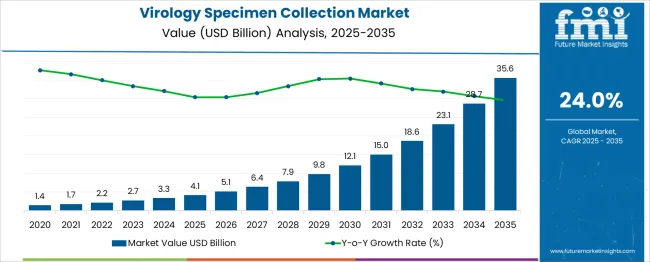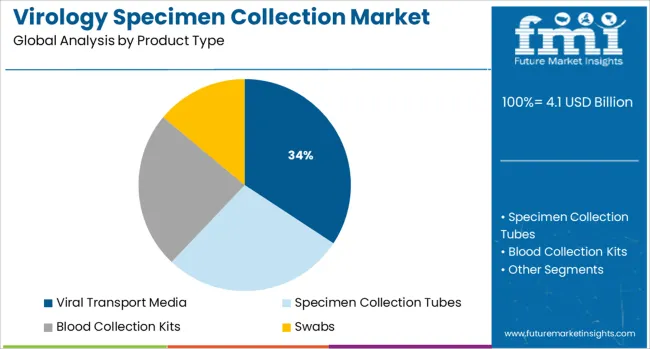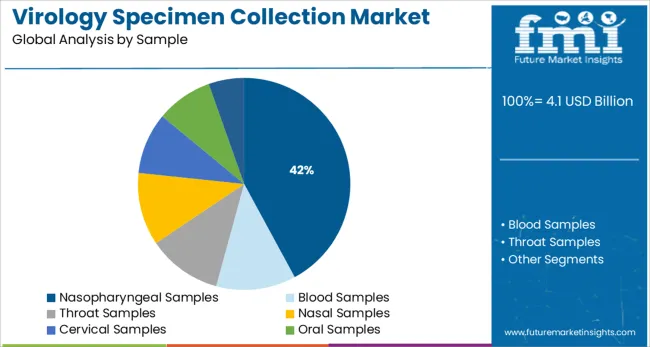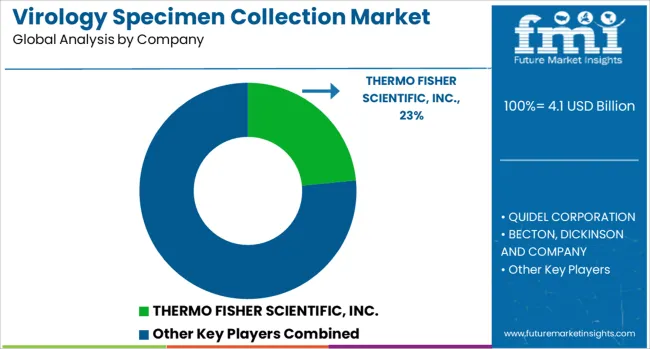The Virology Specimen Collection Market is estimated to be valued at USD 4.1 billion in 2025 and is projected to reach USD 35.6 billion by 2035, registering a compound annual growth rate (CAGR) of 24.0% over the forecast period.

| Metric | Value |
|---|---|
| Virology Specimen Collection Market Estimated Value in (2025 E) | USD 4.1 billion |
| Virology Specimen Collection Market Forecast Value in (2035 F) | USD 35.6 billion |
| Forecast CAGR (2025 to 2035) | 24.0% |
The virology specimen collection market is expanding steadily, driven by increased demand for accurate and timely diagnosis of viral infections, as well as advancements in specimen collection technologies. Healthcare system reports and laboratory industry updates have indicated heightened testing volumes due to both endemic viral diseases and preparedness measures for potential outbreaks. The adoption of high-quality specimen collection tools has been reinforced by global health authority guidelines, which emphasize sample integrity as a critical factor in diagnostic accuracy.
Manufacturers have introduced sterile, transport-stable collection kits that extend sample viability and improve viral detection rates. Growing investments in laboratory infrastructure and diagnostic capacity, particularly in emerging economies, have further strengthened market growth.
Additionally, awareness campaigns promoting early detection and screening for viral pathogens have increased specimen collection in both clinical and community health settings. Future market momentum is expected to be supported by innovations in transport media formulations, automated sample handling systems, and expansion of testing programs for surveillance and public health management.

The market is segmented by Product Type and Sample and region. By Product Type, the market is divided into Viral Transport Media, Specimen Collection Tubes, Blood Collection Kits, and Swabs. In terms of Sample, the market is classified into Nasopharyngeal Samples, Blood Samples, Throat Samples, Nasal Samples, Cervical Samples, Oral Samples, and Other Samples. Regionally, the market is classified into North America, Latin America, Western Europe, Eastern Europe, Balkan & Baltic Countries, Russia & Belarus, Central Asia, East Asia, South Asia & Pacific, and the Middle East & Africa.
The viral transport media segment is projected to hold 34.25% of the virology specimen collection market revenue in 2025, maintaining a strong position due to its essential role in preserving viral integrity during transportation and storage. This segment’s growth has been supported by advancements in media formulations that enhance pathogen stability over extended periods, even in variable temperature conditions.
Clinical laboratories and diagnostic networks have increasingly relied on viral transport media to ensure accurate molecular and culture-based testing results. Furthermore, compliance with international biospecimen handling standards has reinforced its widespread adoption in public health laboratories and research institutions.
Manufacturers have also focused on producing transport media that are compatible with multiple testing platforms, improving workflow flexibility for healthcare providers. As viral surveillance programs expand globally and point-of-care testing capabilities grow, the demand for reliable transport media is expected to remain robust, securing its relevance as a core component of virology specimen collection workflows.

The nasopharyngeal samples segment is projected to contribute 42.10% of the virology specimen collection market revenue in 2025, leading the sample type category due to its established role as the gold standard for detecting a wide range of respiratory viruses. Clinical evidence has consistently demonstrated that nasopharyngeal swabs yield high viral loads, enabling improved detection sensitivity for both PCR and rapid antigen tests.
Hospitals, clinics, and diagnostic laboratories have prioritized nasopharyngeal sampling for its reliability in early-stage infection detection. Additionally, standardized sampling protocols and the availability of sterile, ergonomically designed swabs have supported accurate and patient-tolerable collection.
Public health screening initiatives, particularly during influenza and coronavirus surveillance programs, have significantly boosted the use of nasopharyngeal samples. As respiratory viral diagnostics continue to expand and testing technologies evolve to accommodate multiplex detection, this sample type is expected to maintain its dominant market share, reinforced by strong clinical trust and consistent diagnostic performance.
High awareness levels regarding the disease transmission, diagnosis, and effective management of microbial infections have been observed in North America. In addition, government initiatives to support product development for virology specimen collection is influencing market growth.
In addition, large share of North America in this market can be attributed to the increasing adoption of NAT (due to the high prevalence of TTIs). Furthermore, technological developments including portable diagnostics is favoring the growth of the market.
Growing income levels, greater health awareness, and the rising incidence of lifestyle diseases is contributing to the growth of virology specimen collection market. Currently, ELISA is widely used in India, with NAT registering relatively low penetration.
Emerging markets such as India, the Middle East, and Africa offer promising opportunities for players in the virology specimen collection industry due to their increasing disposable incomes and improving healthcare infrastructure.
NAT is still not mandatory in India, thus, states in India are using NAT in ID-NAT format. For Instance, AIIMS, PGI Chandigarh, CMC Vellore, Medanta-The Medicity, and Narayana Hrudayalaya, are using, and 40 blood banks are using the pooling technique. Similarly, the Indian government is taking initiatives to train doctors, hospitals, and blood banks to use NAT.
On the other hand, regions like US, Canada, most of Europe, Japan, Korea, Singapore, Sri Lanka, UAE, South Africa, Thailand, and China. Almost 100 blood banks are using Nat for virology specimen collection.
The growth virology specimen collection market has stagnated in recent times because of the diverted focus of public healthcare resources towards the detection of widespread coronavirus infections.
The frequent outbreak of viral diseases in different parts of the world has provided the necessary impetus for adopting successful innovations in the virology specimen collection processes and devices. Market players in the high-income countries are at the forefront of taking advantage of these facilities to dominate the global microbiology specimen collection market.
ELISA is a main source for diagnosis because of its affordability, although enhanced sources are still prohibitively expensive, posing a market problem.
In the short term, relying on ELISA is a crucial impediment to the growth of NAT's virology specimen collection market. Due to the high expense of sophisticated testing, earlier, less efficient tests, such as first-generation ELISA, are being used more frequently. Flu, Zika virus, STDs, AIDS, and Ebola virus public awareness campaigns are also a crucial component in raising public knowledge and, as a result, affecting the market growth.
While it is encouraging that new diagnostic techniques are becoming accessible to improve clinical treatment in low-resource settings, the cost of each test is a significant barrier to acceptance and long-term use.
Only giant corporations can afford significant capital expenditures and high R&D and manufacturing costs. New entrants will be unable to enter the market due to this.
The demands a decrease in the cost of microbiology specimen collection products will continue to stifle market expansion until it is met and overcome.
The epidemics of Zika and Babesia and news that they would be included in virology specimen collecting tests highlight the need for new microbiology specimen collection technologies, consumables, and equipment. Other governments have launched their efforts to monitor new and emerging illnesses.
The prevalence of malaria in African countries, collection, transportation, and storage of samples for viral diagnosis and the risk of Zika virus transmission via mosquitos has resulted in regulations for Zika virus screening across the region. Various medium solutions have been suggested for stabilizing specimens to identify bacteria and viruses, especially during diagnostic investigations.
To strengthen pandemic management, microbiology specimen collection and future preparedness for COVID-19 and other infectious diseases, international strategies for the regulation, evaluation, and use of digital technologies such as digital epidemiological surveillance, rapid case identification, interruption of community transmission, transport of viral specimen and future preparedness for COVID-19 and other infectious diseases must be aligned.
A variety of protein supplements have been and continue to be prescribed to improve viral stability. These are generally made up of balanced salt or saline solutions with a buffering ability to keep the pH close to neutral. While some laboratories collect, transport, and store samples for viral diagnosis, commercial preparations are often utilized and generally come with sterile swabs as part of a sample collection kit.
The overall growth of global virology specimen collection market comes from the united growth of virology transport media and nasopharyngeal sample.
The global market study on the virology specimen collection market is segmented into categories; Product type sample. These categories and their segment’s performance differ with different regions. There are segments like blood collection kits, specimen collection, viral transport media, and swabs based on product type.
Based on the sample, the segments are blood samples, nasopharyngeal samples, throat samples, cervical samples, oral samples and other samples. The services related to it are virology sample collection, laboratory testing and microbiology specimen collection.
The virology specimen collection market report tells that the virology transport media segment is likely to perform better than any other segment of product type categories. The reason behind the growth of this specific segment is the high number of blood donations having all around the world.
Also, the emergence of new pathogens is driving the force behind the sales of virology specimen collection and virology transport media. Consumers are getting aware about the global blood banks with the increasing number of cancer cases, which encourages them to donate blood.
The nasopharyngeal sample segment holds the most significant portion of the market share. The primary reason behind that is the fast detection of transmissible transfusion infection (TTIs) and the increased prevalence of HPV-related cancers (all cervical cancers) & human papillomavirus (HPV).
The transmissible infections led to nasopharyngeal samples more often in the healthcare and medical industry. Emerging trends in the virology specimen collection market also estimate that the nasopharyngeal samples are likely to witness the highest sales post the forecast period.

The market for virology specimen collection is highly consolidated. In the virology specimen collection market, the key players are Becton, Dickinson and Company (USA), Quidel Corporation (USA), Thermo Fisher Scientific Inc. (USA), Trinity BIoTech (Ireland), and Titan BIoTech Ltd. (India). These key players accounted for a combined majority market share in 2024.
There is fierce competition among Key players in the virology specimen collection market. Only major corporations can afford significant capital expenditures and high R&D and manufacturing costs. New entrants will face difficulties entering the virology specimen collection market due to this.
Along with these considerations comes the requirement for the application of digital technology, such as digital epidemiological surveillance, future preparation for COVID-19 and other infectious illnesses, pandemic management, community transmission interruption, and rapid case identification. As a result of these factors, the virology specimen collection market is expected to have numerous potential opportunities in future years.
The global virology specimen collection market is estimated to be valued at USD 4.1 billion in 2025.
The market size for the virology specimen collection market is projected to reach USD 35.6 billion by 2035.
The virology specimen collection market is expected to grow at a 24.0% CAGR between 2025 and 2035.
The key product types in virology specimen collection market are viral transport media, specimen collection tubes, blood collection kits and swabs.
In terms of sample, nasopharyngeal samples segment to command 42.1% share in the virology specimen collection market in 2025.






Full Research Suite comprises of:
Market outlook & trends analysis
Interviews & case studies
Strategic recommendations
Vendor profiles & capabilities analysis
5-year forecasts
8 regions and 60+ country-level data splits
Market segment data splits
12 months of continuous data updates
DELIVERED AS:
PDF EXCEL ONLINE
Virology Market Analysis - Growth & Forecast 2025 to 2035
Specimen Transport Bags Market Size and Share Forecast Outlook 2025 to 2035
Specimen Retrieval Nets Market
Specimen Container Market
Specimen Radiography Systems Market
Disposable Specimen Container Market
Debt Collection Software Market Size and Share Forecast Outlook 2025 to 2035
Bile Collection Bags Market Size and Share Forecast Outlook 2025 to 2035
Blood Collection Devices Market Insights – Trends & Forecast 2025 to 2035
Urinary Collection Device Market Size and Share Forecast Outlook 2025 to 2035
Evidence Collection Tubes Market Size and Share Forecast Outlook 2025 to 2035
Vacuum Blood Collection Device Market Analysis - Size, Share & Forecast 2025 to 2035
Assessing Vacuum Blood Collection Devices Market Share & Industry Trends
Electronic Toll Collection Market Analysis by Product Type, Technology Type, Application Type, and Region Through 2025 to 2035
Medical Waste Liquid Collection Device Market Size and Share Forecast Outlook 2025 to 2035

Thank you!
You will receive an email from our Business Development Manager. Please be sure to check your SPAM/JUNK folder too.
Chat With
MaRIA